- Home
- Joy Fielding
Now You See Her
Now You See Her Read online
ALSO BY JOY FIELDING
The Wild Zone
Still Life
Charley’s Web
Heartstopper
Mad River Road
Puppet
Lost
Whispers and Lies
Grand Avenue
The First Time
Missing Pieces
Don’t Cry Now
Tell Me No Secrets
See Jane Run
Good Intentions
The Deep End
Life Penalty
The Other Woman
Kiss Mommy Goodbye
Trance
The Transformation
The Best of Friends
Copyright © 2011 Joy Fielding, Inc.
All rights reserved. The use of any part of this publication, reproduced, transmitted in any form or by any means electronic, mechanical, photocopying, recording or otherwise, or stored in a retrieval system without the prior written consent of the publisher—or in the case of photocopying or other reprographic copying, license from the Canadian Copyright Licensing Agency—is an infringement of the copyright law.
Doubleday Canada and colophon are registered trademarks
Library and Archives of Canada
eISBN: 978-0-385-67398-3
Fielding, Joy
Now you see her / Joy Fielding.
I. Title.
PS8561.I52N69 2011 C813′.54 C2010-905252-8
This book is a work of fiction. Names, characters, places and incidents are products of the author’s imagination or are used fictitiously. Any resemblance to actual events or locales or persons, living or dead, is entirely coincidental.
Published in Canada by Doubleday Canada, a division of Random House of Canada Limited
Visit Random House of Canada Limited’s website: www.randomhouse.ca
v3.1
For my two gorgeous girls,
Shannon and Annie.
I love you more than words could ever say.
ACKNOWLEDGMENTS
As always, my thanks to Larry Mirkin, Beverley Slopen, Tracy Fisher, Emily Bestler, Sarah Branham, Judith Curr, Louise Burke, David Brown, Brad Martin, Maya Mavjee, Kristin Cochrane, Val GOW, Adria Iwasutiak, and Corinne Assayag. Thanks as well to some recent recruits—Pauline Post, Carole Schwindeller, Lynn Henry, and Nita Pronovost. It’s a pleasure to have you aboard.
Thank you also to my various publishers, agents, and translators around the world for the magnificent job you’re doing.
Special thanks to my wonderful family—my husband, Warren, and daughters Shannon and Annie, Annie’s husband, Courtney, and my beautiful new grandson, Hayden, who makes me smile every time I picture his sweet little face. Thanks also to my sister Renee and to Aurora for her continuing efforts to make me as comfortable as possible.
And finally, I raise a pint of beer to the magnificent country of Ireland. I look forward to returning there again soon.
Contents
Cover
Other Books by This Author
Title Page
Copyright
Dedication
Acknowledgments
Chapter One
Chapter Two
Chapter Three
Chapter Four
Chapter Five
Chapter Six
Chapter Seven
Chapter Eight
Chapter Nine
Chapter Ten
Chapter Eleven
Chapter Twelve
Chapter Thirteen
Chapter Fourteen
Chapter Fifteen
Chapter Sixteen
Chapter Seventeen
Chapter Eighteen
Chapter Nineteen
Chapter Twenty
Chapter Twenty-one
Chapter Twenty-two
Chapter Twenty-three
Chapter Twenty-four
Chapter Twenty-five
Chapter Twenty-six
Chapter Twenty-seven
Chapter Twenty-eight
Chapter Twenty-nine
Chapter Thirty
Chapter Thirty-one
ONE
OKAY, IF YOU’LL ALL just gather around me for a few seconds, I’ll give you a wee bit of information about this glorious building in front of you.” The guide smiled encouragingly at the group of tired and somewhat bedraggled-looking tourists milling around the front of St. Anne’s Shandon Church. “That’s it, darlin’,” he cajoled in his exaggerated Irish lilt, the emerald-green scarf in his hand waving impatient circles around his portly frame. “Move in a little closer, young lady. I won’t bite you.” His smile widened, revealing a bottom row of spectacularly stained and crooked teeth.
Good thing her husband hadn’t made the trip to Ireland after all, Marcy Taggart thought, taking several reluctant steps forward. He’d have interpreted the poor man’s lack of a perfect smile as a personal affront. People spend all this money on facelifts and designer clothes, and they forget about the most important thing of all—their teeth, he often fumed. Peter was an orthodontist and therefore prone to such pronouncements. Hadn’t he once told her that the first thing that had attracted him to her wasn’t her slim figure or her large, dark brown eyes but rather her obvious regard for oral hygiene, as evidenced by her straight, flawlessly white teeth? To think she’d once found such statements flattering, even romantic; Marcy marveled at it now.
“Can I have your full attention, please?” the tour guide asked with only a hint of reproach in his voice. He was clearly used to the casual rudeness of those in his charge and had ceased to take offense. Even though the largely middle-aged group of twenty-four men and women had paid a lot of money for the day’s excursion to Cork, the Republic of Ireland’s second-largest city, with a population of approximately 120,000, only a handful of those in attendance had actually been paying attention to anything the man had been saying since leaving Dublin.
Marcy had tried, she really had. She’d repeatedly instructed herself to focus as the guide educated them on the history of Cork during the seemingly interminable bus ride, 168 miles of severely congested highway and narrow country roads. She’d learned that the name Cork was derived from the Irish word “corcach,” pronounced “kar-kax,” meaning “marshy place,” because of its situation on the river Lee; that it had been founded in the sixth century AD and now served as the administrative center of county Cork, and that it was the largest city in the province of Munster. Corkorians, as they were known, often referred to Cork as “the real capital of Ireland.” Its nickname was “the Rebel County,” the town’s reputation for rebelliousness having something to do with its support of the English pretender Perkin Warbeck back in 1491, following the War of the Roses. Today it was better known as the heart of industry in the south of Ireland, the chief industry being pharmaceuticals, its most famous product none other than Viagra.
At least that’s what Marcy thought their guide had said. She couldn’t be sure. Her imagination had an unfortunate tendency to get the better of her these days, and at fifty, her once prodigious memory for facts both useful and otherwise was no longer what it used to be. But then, she thought, grit-filled eyes surreptitiously scanning the glazed faces of her fellow travelers, all clearly years past their “best before” date, what was?
“As you can see, because of its envious hilltop position, the tower of St. Anne’s Shandon Church dominates the entire north side of the city,” the guide was saying now, his voice rising to be heard over the other competing tour groups that had suddenly materialized and were jockeying for position on the busy street corner. “St. Anne’s is Cork’s prime landmark, and its giant pepper-pot steeple, which was built in 1722, is widely regarded as a symbol of the city. No matter where you are in the downtown area, you can see the m
arvelous stone tower, on whose top sits a gilt ball and a unique fish weather vane. Two sides of the tower are faced with red sandstone, the other two with white limestone, from which the colors of the Cork hurling and football teams are taken.” He pointed toward the large, round, black-and-gold clock in the middle of the bottom tier of the four-tiered steeple. “Corkorians depend on Shandon clock for their time and its weather vane for their weather forecast.” A gentle chorus of bells suddenly drifted down the hill from the church, bringing forth oohs and aahs from those nearby. “That’s our famous peal of eight bells,” the guide said proudly. “As you’ve probably already noticed, you can hear them all over the city all day long. And if you choose to climb the belfry, you can even play the bells yourself. Any tune you want, although most people seem to pick either ‘Danny Boy’ or ‘Ave Maria.’ ” He took a deep breath. “Okay, you have thirty minutes to visit the inside of the church, then we’ll head over to Patrick’s Hill, so you can get a feel for its steepness. Americans say it rivals the notorious streets of San Francisco.”
“What if we’re not up to the climb?” an elderly woman asked from the back of the crowd.
“I think I’m all churched out,” the man beside her muttered. “I don’t know about the rest of you, but I could use a pint of Guinness.”
“For those of you who have seen enough and would prefer to enjoy a bit of rest and relaxation before heading back to the bus, there’s no shortage of pubs in the area. Although you’re more likely to find the locals drinking Murphy’s or Beamish, two stouts that are brewed right here in Cork.”
“Sounds good to me,” someone said.
“We’ll meet back at Parnell Place Bus Station in one hour,” the guide announced. “Please be prompt or we might not have enough time to visit the famous Blarney Castle on our way back to Dublin. And you don’t want to miss out on kissing the legendary Blarney Stone, do you?”
No, we certainly wouldn’t want to miss out on that, Marcy thought, recalling Peter’s revulsion at the idea of being held by his feet and suspended backward and upside down like a bat in order to kiss “some dirty piece of bacteria-soaked gray rock coated with other people’s saliva,” as he’d so memorably phrased it when she’d first shown him the brochures. “Who in their right mind would want to do such a thing?” he’d asked accusingly.
Marcy had smiled and said nothing. Peter had ceased believing she was in her right mind some time ago.
Wasn’t that why she’d agreed to go on this trip in the first place? Hadn’t everyone been telling her that it was important—some said crucial—for both her mental health and her marriage that she and Peter spend more time together, time in which they could come to terms with what had happened, as a unit? Wasn’t that the term her psychiatrist had used?
So when her sister had first floated the idea of a second honeymoon in honor of their twenty-fifth wedding anniversary, Marcy had thrown herself into its planning with every fiber of her being. It had been Peter’s suggestion to go to Ireland, his mother having been born in Limerick. He’d been talking for years of making a pilgrimage to the land of his ancestors. Marcy initially argued in favor of somewhere more exotic, like Tahiti or Bali, someplace where the average July temperature was substantially more than sixty-six degrees, where she could sip mai tais on the beach and wear flowers in her hair instead of a place where Guinness was the order of the day and the humidity would pretty much guarantee she’d always look as if a clump of unruly moss had just landed on her head. But what difference did it make where they went, she’d reasoned, as long as they went there as a unit?
So Peter’s choice it was.
And ultimately, Peter had chosen someone else.
Did one person still qualify as a unit? Marcy wondered now, recognizing that as much as she loved the often-spectacular scenery and the much-vaunted forty shades of green of the Irish countryside, she hated its dull, rain-filled skies and the pervasive dampness that clung to her like a second skin.
He couldn’t take any more drama, he’d said when he told her he was leaving. It’s better this way. We’ll both be better off. You’ll see, you’ll be much happier. Hopefully, eventually, we can be friends. The cowardly clichés of the deserter.
“We still have a son together,” he’d told her, as if she needed reminding.
No mention of their daughter.
Marcy shivered, gathering the sides of her trench coat together, and decided to join the ranks of those opting for a brief respite and a pint of beer. They’d been on the go since their bus had pulled out of Dublin at eight thirty that morning. A quick lunch at a traditional Irish pub when they’d first arrived in Cork had been followed by a three-hour walking tour of the city, a tour that included such landmarks as the Cork city jail, spelled “gaol”; the Cork Quay Market, pronounced “Kay”; the opera house; and St. Fin Barre’s Cathedral, as well as a stroll down St. Patrick’s Street, the city’s main shopping thoroughfare. It was now concluding with this visit to St. Anne’s Shandon Church and a proposed hike up the steep slope of Patrick’s Hill. Since Cork’s center was located on an island lying between two branches of the river Lee, the city naturally divided into three main sections: the downtown core known as the “flat of the city,” the North Bank, and the South Bank. Marcy had spent the entire afternoon crossing one bridge after another. It was time to sit down.
Ten minutes later, she found herself alone at a tiny table for two inside another traditional Irish pub overlooking the river Lee. It was dark inside, which suited the mood that was rapidly overtaking her. She was crazy to have come to Ireland, she was thinking. Only a crazy woman goes on her second honeymoon by herself, even if the trip had already been paid for in advance, even if most of the money was nonrefundable. It wasn’t as if she couldn’t afford the loss of a few thousand dollars. Peter had been more than generous in his settlement offer. Clearly he’d wanted to get away from her as quickly and with as little effort as possible. Marcy found herself chuckling. Why should he put any more effort into their divorce than he’d put into their marriage?
“You find something amusing, do you?” a voice asked from somewhere above her head.
Marcy looked up to see a roguishly handsome young man with enviably straight black hair falling into luminous, dark green eyes. She thought he had the longest eyelashes she’d ever seen.
“What can I get you, darlin’?” the young man said, notepad and pencil poised to take her order.
“Would it be too ridiculous to order a cup of tea?” Marcy surprised herself by asking. She’d been planning on having a Beamish, as the tour guide had suggested. She could almost hear Peter admonish her: It’s just like you to be so contrary.
“Not ridiculous at all,” the waiter said, managing to sound as if he meant it.
“Tea sounds wonderful,” she heard someone say. “Could you make that two?” Beside her, a chair scraped the wood planks of the floor. “Do you mind if I join you?” The man sat down before Marcy had a chance to respond.
Marcy recognized him as a member of her tour group, although she couldn’t remember his name. Something Italian, she thought, placing him in the window seat three rows from the front of the bus. He’d smiled at her as she’d made her way to the back. Nice teeth, she’d heard Peter whisper in her ear.
“Vic Sorvino,” he said now, extending his hand.
“Marcy Taggart,” Marcy said without taking it. Instead she gave a little wave she hoped would satisfy him. Why was he here? There were other tables he could have chosen to sit at.
“Taggart? So you’re Irish?”
“My husband is.”
Vic looked toward the long bar that ran the entire length of the room. “I’m sorry, I didn’t realize you were with anyone,” he said, although he made no move to relinquish his chair.
“He’s not here.”
“Doesn’t like bus tours?”
“Doesn’t like being married,” Marcy heard herself say. “At least to me.”
Vic looked vaguely stunned.
“You’re not big on small talk, are you?”
Marcy laughed in spite of her desire not to and pushed at the mop of curls falling into her narrow face.
So much hair, she thought in her mother’s voice, for such a tiny face.
“I’m sorry,” she said now. “I guess that falls under the category of too much information.”
“Nonsense. I’m of the school that believes information is always useful.”
“Stick around,” Marcy said, immediately regretting her choice of words. The last thing she wanted to do was encourage him.
The waiter approached with their teas.
“He probably thinks we’re crazy, ordering tea in a pub,” Marcy said, following the handsome young man with her eyes as he returned to the bar, watching him flirt with several of the women clustered on high stools around him. She watched him fill half a dozen mugs of draft beer and slide them with a flick of his wrist across the dark polished wood of the bar toward a group of noisy young men at the far end. His female admirers broke into a round of admiring applause. He can have any woman he wants, she thought absently, estimating his age as early thirties and wondering if her daughter would have found him attractive.
“Actually, Americans have the wrong idea about Irish pubs,” Vic was saying, his easy baritone pulling her back into the conversation. “They’re not bars, and they’re as much about socializing as drinking. People come here to see their friends and neighbors, and lots of them choose tea or soft drinks over alcohol. I’ve been reading the guidebooks,” he admitted sheepishly, then, when Marcy remained silent, “Where are you from?”
“Toronto,” she answered obligingly.
“Toronto’s a lovely city,” he said immediately. “I was there a few times on business.” He paused, obviously waiting for her to ask: When? What business? When she didn’t, he told her anyway. “It was a few years back. I was in the manufacturing business. Widgets,” he said.
“You manufacture midgets?” Marcy asked, realizing she’d been listening with only half an ear.

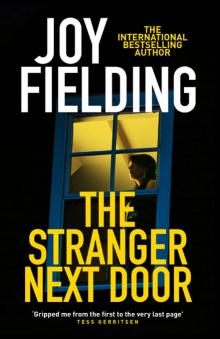 The Stranger Next Door
The Stranger Next Door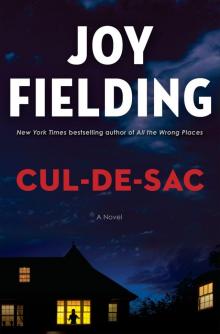 Cul-de-sac
Cul-de-sac The Final Act
The Final Act When I Looked Away
When I Looked Away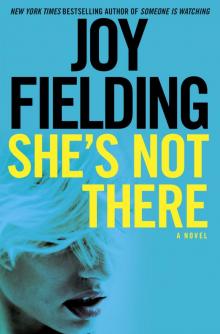 She's Not There
She's Not There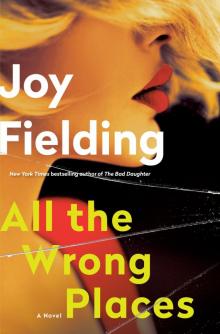 All the Wrong Places
All the Wrong Places Now You See Her
Now You See Her Don't Cry Now
Don't Cry Now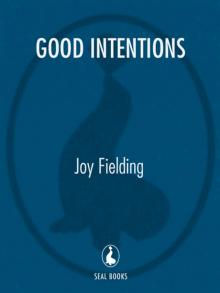 Good Intentions
Good Intentions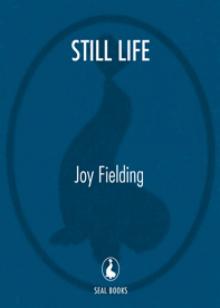 Still Life
Still Life Lost
Lost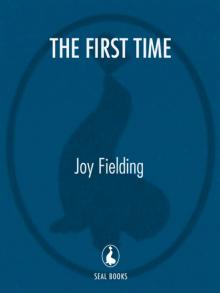 The First Time
The First Time Whispers and Lies
Whispers and Lies The Other Woman
The Other Woman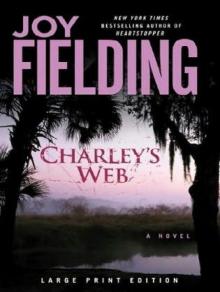 Charley's Web
Charley's Web Mad River Road
Mad River Road Puppet
Puppet Life Penalty
Life Penalty The Wild Zone
The Wild Zone Home Invasion
Home Invasion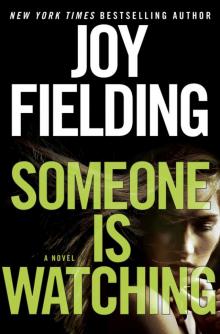 Someone Is Watching
Someone Is Watching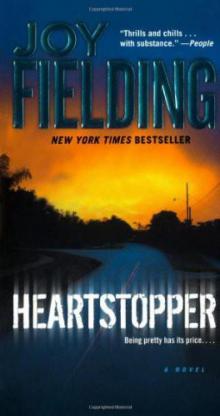 Heartstopper
Heartstopper See Jane Run
See Jane Run The Bad Daughter
The Bad Daughter Shadow Creek
Shadow Creek Missing Pieces
Missing Pieces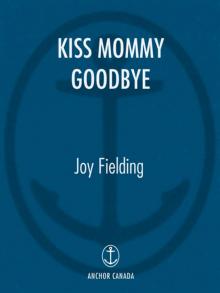 Kiss Mommy Goodbye
Kiss Mommy Goodbye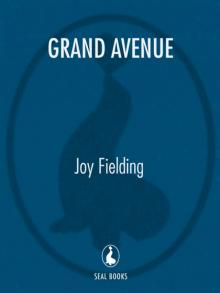 Grand Avenue
Grand Avenue